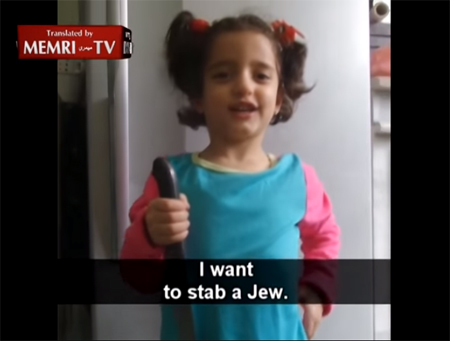According to Agence France Presse, a major global wire service, there is a neat divide between what analysts think of Palestinian incitement and what Israel thinks.
Analysts as a whole, AFP suggests in a story published this morning, don’t accept the view that Palestinian incitement has contributed to the recent spate of violent attacks on Israelis. This, readers are told, is nothing more than a claim by the Israeli government:
Analysts say Palestinian frustration with Israeli occupation and settlement-building in the West Bank, the complete lack of progress in peace efforts and their own fractured leadership have fed the unrest.
Israel says incitement by Palestinian leaders and media is a leading cause of the violence.
But, of course, it isn’t only Israel that describes Palestinian incitement as a problem. Plenty of analysts do, too.
Alon Ben Meir, a senior fellow at New York University’s Center for Global Affairs, has described Palestinian incitement as “verbal and written onslaughts that support the use of violence and perpetuate radical political narratives.” This incitement, he continued, is causally linked to anti-Israel attacks: “A renewed focus has been placed on the issue of Palestinian incitement, as the indiscriminate violence that it helps to create has returned.”
 Journalist Shlomi Eldar, former fellow at the Wilson Center and currently with NYU’s Taub Center for Israel Studies, has documented what he called “empirical evidence of the impact of the Palestinian media and the way that it encourages young Palestinians to follow in the footsteps of other ‘martyrs.'”
Journalist Shlomi Eldar, former fellow at the Wilson Center and currently with NYU’s Taub Center for Israel Studies, has documented what he called “empirical evidence of the impact of the Palestinian media and the way that it encourages young Palestinians to follow in the footsteps of other ‘martyrs.'”
Analyst Joel Fishman has described an “insurmountable incompatibility” between Palestinian incitement and peace.
An analysis by Khaled Abu Toameh, an Arab Muslim journalist, concluded that anti-Israel terror attacks in Jerusalem were a “direct result” of a campaign of Palestinian incitement.
A report by the Quartet, a group comprised of the UN, US, EU, and Russia focused on Middle East peacemaking, found that
Palestinians who commit terrorist attacks are often glorified publicly as “heroic martyrs.” Many widely circulated images depict individuals committing terrorist acts with slogans encouraging violence. The spreading of incitement to violence on social media has gained momentum since October 2015, and is particularly affecting the youth.
Hamas and other radical factions are responsible for the most explicit and widespread forms of incitement. These groups use media outlets to glorify terrorism and openly call for violence against Jews, including instructing viewers on how to carry out stabbings. Following the April 2016 bombing of an Israeli bus that injured at least 21 people, Hamas staged a rally celebrating the attack.
Professor Shlomo Avineri has argued that progress toward resolution of the Palestinian-Israeli conflict would require, among other things, “a fundamental change in the Palestinian education system and in its propaganda, both of which evince a deep hatred toward Israel.”
And so on, and so on, from John Kerry (who referred to a Palestinian terror attack as a “pure result of incitement”) to the ADL and even to The New York Times and J Street, analysts independent from, and often in opposition to, the Israeli government have highlighted Palestinian incitement as part of what fuels anti-Israel violence and the conflict as a whole.
